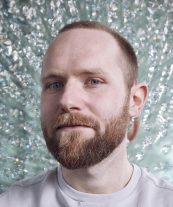COMMON GROUNDS: Frank Kolkman x Fides Lapidaire
 1
1
 2
2
— ‘If everything is easy, you’re not discovering anything new’
Speculative designer Frank Kolkman won the Dutch Design Award in the Young Designer category in 2017. Combining his passion for hacking with a fascination for collective imagination, he has created projects like a DIY surgery robot and a kit allowing patients to develop their own treatments for rare diseases. Frank turns the spotlight on social designer Fides Lapidaire, who shows how human waste can contribute to healthier soil by selling “Shit Sandwiches” from her food truck.
Frank: “What I find interesting about Fides’ work is the way she breaks down complex systems into something accessible and provocative—you can’t look at it without forming an opinion. Instead of offering ready-made solutions, she empowers people to take action. Her work is participatory, always involving both the public and experts in the development of a project.”
Fides: “For me, undergoing an experience is essential–that’s where you encounter hidden knowledge. A passive spectator becomes an active participant, reaching a deeper understanding, which hopefully sparks awareness. This interaction with the audience guides me to my next step. I admire the way Frank’s speculative designs allow you to momentarily step into another reality. He creates a ‘what-if’ world that naturally leads to new follow-up questions. To me, good design is not so much about finding solutions–it’s about creating space for meaningful questions. I see Frank’s work as an invitation to think more deeply.”
Leitmotif
Fides: “I’m endlessly fascinated by the topic of ‘poop’, the many different issues connected to it. It’s about soil quality, but also about empowerment: You can’t end all the suffering in the world, but you can poop and through that, create soil. How cool is that? I want us all to feel that sense of power and reciprocity. My love affair with poop has only deepened over time–in fact, it feels like a marriage.”
Frank: “If I could marry a concept, it would be ‘collective imagination’ and how it can be expressed in design. How can we shape new, collective visions of the future, and alternative realities? My practice is rooted in my love for hacking, because I want to understand how things work. By taking things apart, you uncover the decisions that were made during its design and development.”
System
Frank: “In Western society, many things that make us uncomfortable have been outsourced or hidden in industrial processes–healthcare, sewage systems, or food production. These processes have been pushed out of sight so we don’t have to confront them directly. But that doesn’t mean they don’t exist.”
Fides: “I believe we’re living in a ‘dependency paradox’. We’re more dependent on systems than ever, yet we feel increasingly independent. We view systems, such as the government, as a service meant to meet our needs. And our primary need is to remain uninformed and be as comfortable as we can. We use money as a salveto erase our sense of dependency and the fear that comes with it.”
Frank: “It’s a double-edged sword. Systems themselves aren’t inherently bad–they’ve helped solve many problems we were afraid of. But we’re starting to realize that we’ve shaped the world with too narrow a perspective. The system we are part of does indeed make us dependent. In this system, you’re primarily a consumer with little agency. And if you don’t fit certain norms, you quickly run into problems.”
Fides: “We want so many things in society to change, but you have to start with questioning the underlying values and the ‘that’s-just-the-way-it-is’ mindset. I’ve been working more with institutions lately, and I’ve noticed a huge gap when it comes to asking those kinds of questions. I’m not exactly welcomed with open arms yet, but I’m determined to push my way in. Tinkering with society is rewarding, but it’s very difficult at first. As designers, we actively seek out that discomfort because that’s where the real friction–and power–lies.”
Frank: “The deadliest question anyone can ask is: ‘Great idea, but what’s the impact?’ People try to quantify the new within the frameworks of the existing, but a different paradigm requires new rules. It’s like throwing a pebble into the water and hoping it will eventually cause a tsunami–predicting that ‘ripple effect’ is almost impossible. Many ideas are ruled out because of risk management, but that’s a false sense of security. My goal is to create ‘open spaces’ within companies and institutions, where you can create visualizations. Discomfort should be the measure of success. If everything is easy, you’re not discovering anything new.”
Evelien Reich has served as chair of the Young Designer jury of Dutch Design Awards for the past three years. This year, she interviews the Young Designers that DDA has selected from the archives, as well as the emerging talents they choose to spotlight. All twenty Young Designers, both past and present, will showcase their work at the 2024 DDA exhibition during Dutch Design Week in Eindhoven, taking place 19 to 27 October.
Discover the work of Frank Kolkman and Fides Lapidaire and all the other Young Designers of the Past & Present in the DDA24 exhibition at Microlab Hall on Strijp-S, during Dutch Design Week. From 19 to 27 October 2024 in Eindhoven.